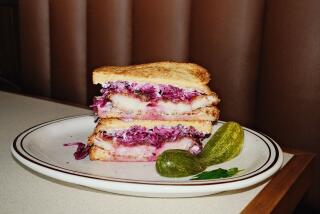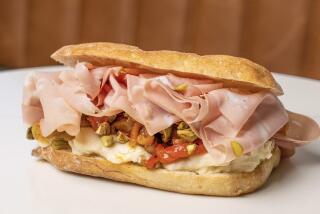Review: Charming ‘Deli Man’ takes a hearty look at the kosher deli

Kenneth Turan reviews ‘Deli Man’. Video by Jason H. Neubert.
In 1931, New York City’s Department of Public Markets listed 1,550 kosher delicatessens in the five boroughs alone. Today there are an estimated 150 in all of North America. Much to its credit, the documentary “Deli Man” wisely chooses not to bemoan the decline but to celebrate the robust survivors that remain as well as the culture they preserve.
An unexpectedly charming documentary directed by Erik Greenberg Anjou that is warm and piquant as well as informative, “Deli Man” understands the reasons for those statistics. It’s well aware of the wages of assimilation and the fact that the waves of Yiddish-speaking immigrants from the Eastern European homelands that gave the kosher deli its unique tam or taste are no more.
Rather, taking as its motto Damon Runyon’s thought that “there are two types of people in the world, those who love delis and those you shouldn’t associate with,” “Deli Man” focuses on describing the essence of the deli experience and conveying it to a waiting world.
Our main guide on this excursion is the shambling but appealing David “Ziggy” Gruber, a third-generation deli man and the Ziggy in Kenny & Ziggy’s New York Delicatessen Restaurant, a much-loved establishment that is the toast of Houston. And don’t be surprised at the location. “The south is like ‘Deliverance’ for Jews,” one witness insists. “Everyone down here is related.”
Grumpy but good-hearted, and the always-working despair of friends who want to see him married, Gruber, says his younger brother, “has been an 80-year-old Jew since he was a little kid.” Gruber flirted with serious cuisine, at one time working with Gordon Ramsay at the Waterside Inn, but the siren song of the deli, the chance to carry on the tradition of his beloved grandfather, was too strong to resist.
Gruber not only runs a great deli; he is something of a deli historian who collects menus from eminent New York establishments like Lindy’s and the Stage, run by the celebrated Max Asnas, who was dubbed “the corned beef Confucius” by comic Fred Allen. Gruber is the kind of guy whose idea of a vacation in New York is visiting Acme Smoked Fish and comparing notes on the quality of whitefish with its fourth-generation operator Adam Caslow.
To go further back in deli history, “Deli Man” enlists writer and food historian Jane Ziegelman, who relates it was homesick Germans who started the first New York delis on the Lower East Side in the 1840s and ‘50s. East European Jews patronized these places (sweatshop workers especially liked the deli’s early versions of fast-food) and soon made them their own.
“Deli Man” also provides stories of legendary delis, like New York’s Carnegie, the home of sandwiches so big, one diner insists, “you needed a jaw adjustment” after eating one. The comedian Henny Youngman was one of the place’s regulars, announcing his presence by proclaiming, “I want a table near a waiter.”
The film also introduces us to deli owners who are doing things differently. Wise Sons in San Francisco is more of a fusion establishment than a traditional deli, and Caplansky’s in Toronto emphasizes its ethnic qualities with staff T-shirts reading “The Bad News Jews” and a truck emblazoned with the slogan “Sometimes You Have to Jew It Up.”
“Deli Man” has a definite Los Angeles component, as we get to meet the third-generation owners of Canter’s and Nate ‘n Al. The historically minded will find out where Nate met Al and why they ended up in Beverly Hills, not Hollywood, when they started in 1945. (Hint: They wanted someplace residential.)
In fact, the most fascinating aspect of “Deli Man” is how many second- and third-generation folks are passionate owners of old-style delis. It’s not just the schmaltz that gets in your blood in this business — it’s the tradition as well.
Twitter: @KennethTuran
More to Read
Only good movies
Get the Indie Focus newsletter, Mark Olsen's weekly guide to the world of cinema.
You may occasionally receive promotional content from the Los Angeles Times.











